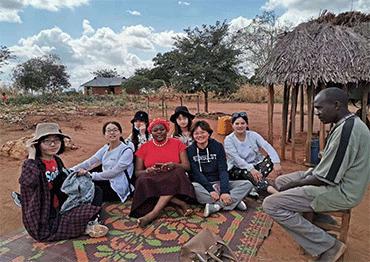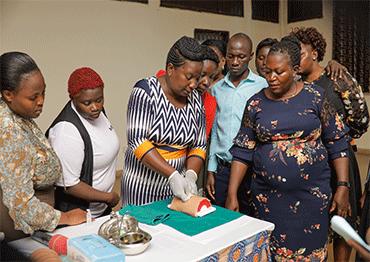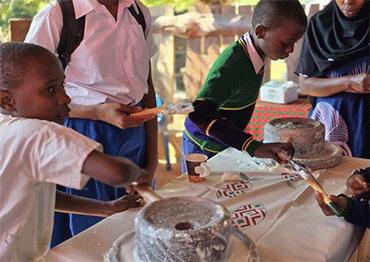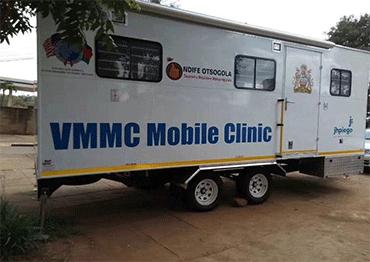In addition to nutritional challenges, Africa faces significant healthcare problems. According to the WHO, sub-Saharan Africa accounted for 77 percent of global maternal deaths in 2020. In nine African countries, including Somalia, South Sudan and Chad, the maternal death rate was twice the global average. Meanwhile, 29.3 percent of the 162 million women with unmet contraception needs worldwide were from sub-Saharan Africa in 2019, according to a Lancet study in 2022.
An example of such need is Mariam Nabatanzi, a Ugandan woman who had her first child at 13, a year after being forced into marriage. Unable to afford birth control, Nabatanzi told her husband to use contraception, but he refused. By 2016, the 36-year-old Nabatanzi had 44 children – including three sets of quadruplets, four sets of triplets and six sets of twins – due to a rare genetic condition that causes hyperovulation. Her husband ultimately abandoned the family in 2015. Six of her children have died. In 2019, Nabatanzi, called “Mama Uganda” by the press, had her tubes tied.
Uganda is one of the major markets for Shanghai-based Dahua Pharmaceutical, a developer of affordable contraceptive implants for women.
Ninety-nine percent effective, Dahua’s product Levoplant is made of a silicon rod filled with levonorgestrel, a synthetic steroid hormone. Inserted below the skin of the upper arm, it is minimally invasive and is effective for three to four years.
Originally selling Levoplant to China’s National Health and Family Commission, Dahua’s business shrank after China’s family planning policies changed.
The turning point for Dahua came in 2007 when Family Health International (FHI360) Foundation visited their factory, bringing a contract worth US$17 million.
“We thought it was a scam at first,” recalled Zhou Chengjie, deputy manager of Dahua, during a July speech hosted by YIXI, China’s equivalent of TED, at Tsinghua University in Beijing. “But after their second visit, we realized the foundation’s true intention – it wanted to purchase our products and donate them to African women living in poverty.”
At the time, a large portion of African men were reluctant to use condoms and disapproved of intrauterine devices. This made subcutaneous implants the best option for upholding African women’s reproductive rights.
However, similar implants from multinational companies were priced at US$18-21 per unit, making them inaccessible for many. Dahua’s Levoplant, priced at 35-yuan (US$5) in the 1990s, was a potential gamechanger.
With support from the Bill and Melinda Gates Foundation and FHI 360, the factory upgraded its assembly lines and conducted clinical researches to meet the UN’s Prequalification of the Medical Products (PQ) standards. In 2017, it finally received PQ certification.
By 2023, Levoplant was priced at about US$7 per unit, and Dahua sold 1.3 million units, a nearly tenfold increase from 20 years ago, thanks to the African market.
“Our mission is to defend women’s reproductive rights, enabling them to decide whether they want children... free from men’s compulsiveness,” Zhou said. He added that many African women like Nabatanzi dream of giving their children the chance at education that they themselves did not have.
For many African women and their male partners, HIV remains a serious health risk. According to the WHO, 65 percent of the estimated 39.9 million people living with HIV are in Africa as of 2023. In 2006, the US National Institutes of Health confirmed that male circumcision significantly reduces HIV transmission. Trials showed that circumcision reduced the risk of infection by approximately 60 percent, findings later endorsed by UNAIDS and the WHO.
However, traditional circumcision surgery can be painful, as Shang Jianzhong, a man from China’s Anhui Province, experienced 20 years ago. Despite anesthetic, the half-hour procedure was the “longest agony my father had ever put up with,” Shang’s daughter Shang Jingjing recalled in her talk at YIXI’s Tsinghua session in July.
In 2005, despite family opposition and with no medical background, Shang Jianzhong founded Wuhu Snnda Medical Treatment Appliance Technology in Anhui. His goal was to develop a faster, less painful circumcision method. It was a bold move, especially since public discussion of circumcision was still taboo in China.
Shang’s invention, the ShangRing, which consists of two concentric rings, simplifies the circumcision process, allowing trained nurses to perform the operation independently in just a few minutes. The device was named after Shang at an international symposium on circumcision devices in Nairobi in 2009.
After years of clinical trials in countries such as South Africa, Kenya and Zambia, in collaboration with leading institutions like Weill Cornell Medical College, Johns Hopkins University, FHI360 and EngenderHealth, as well as local African health organizations, the WHO approved the ShangRing as safe and effective. In 2015, it received WHO PQ certification.
By July 2024, Wuhu Snnda had sold more than 700,000 ShangRings in Africa through international organizations like USAID and Global Fund. Its sales in the African market reached about 210,000 units between September 2023 and August 2024, a 25 percent increase from the previous year. Africa has accounted for 40 percent of the company’s sales for several consecutive years, Shang Jingjing, deputy manager of Wuhu Snnda, told NewsChina.
Reflecting on the company’s journey, Shang Jingjing quoted her father in her YIXI talk: “Persistence leads to hope, not the other way around.”

 Old Version
Old Version



